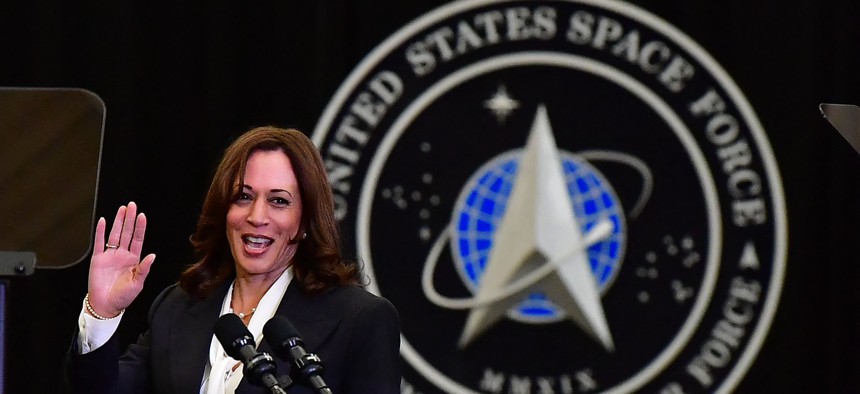Lack of Space National Guard Could Hurt Training, Recruiting

U.S. Vice President Kamala Harris waves to the crowd just before delivering a speech at the Command Space Center at Vandenberg Space Force base in Lompoc, Calif. on April 18, 2022. Frederic J. Brown/AFP via Getty Images
National Guard directors are worried about losing key talent for space capabilities without the creation of a specified guard and reserve component.
Some military leaders are worried that without a Space National Guard or similar component, administrative delays could impact readiness and personnel training.
Lt. Col. Jeremiah "Hitch" Hitchner, the commander of the 109th Space Electromagnetic Warfare Squadron in Guam, told reporters June 10 the brand new unit is struggling with training new operators because it is reliant on Space Force availability.
"We have a lot of operators that we need to send to school. We are getting school slots, but not at the rate we would like," he said, noting that it's "hit or miss on when we get seats" in schools for Space Force training.
"Sometimes they'll say hey, we have enough seats for you. And within another month they'll say we have no seats for you and then we have to go back to the table and renegotiate—we've been doing this for about six months, which is one of the issues we're having."
Hitchner added: "Trying to get a seat for somebody to figure out what their job is that we've been dictated by federally to do," he said. "Easy answer to me, always, is if we were aligned easily under Space Force, especially if we're aligned in [a] Space National Guard would make it super simple."
Senior Master Sgt. Harry Smith, flight chief for the 137th Space Warning Squadron, 233rd Space Group, said it takes several years from basic training through continuing education on weapons systems to develop expert space operators and training process delays could extend that further.
"If everything is synced up that's usually a two-year path for someone. But as we inject latency into those processes, where we can get a slot in time, a member may wait three or four months. We could end up burning maybe three, three and a half years in that process. And for most of our folks …their first enlistment is usually six years. So it takes a long time to produce a status operator," Smith said.
The National Guard has about 1,000 space personnel in Alaska, Arkansas, California, Colorado, Florida, Hawaii, New York, and Ohio, and the U.S. territory of Guam across the Air National Guard and Army National Guard.
The Space Force stood up as a military service under the Department of the Air Force in 2019. No complementary guard or reserve unit was created alongside it. But calls for one have been mounting in recent years.
The creation of the Space National Guard was put on hold earlier this year after the Biden administration expressed concerns that a separate guard would create more bureaucracy. Air Force Secretary Frank Kendall submitted a congressional proposal that would combine an active-duty force with full and part time personnel inside the Space Force as an alternative, according to Space News.
However, in May, several senators proposed a bill to create a National Space Guard by effectively transferring existing space personnel in the Air and Army National Guards to help ensure "Space Force personnel who leave active-duty can continue to serve within the Space Force," Sen. Joe Manchin (D-W.Va.) wrote in a statement announcing the bill.
A similar proposal was left out of the 2022 National Defense Authorization Act. The Senate begins its markup of the 2023 defense policy bill this week.






